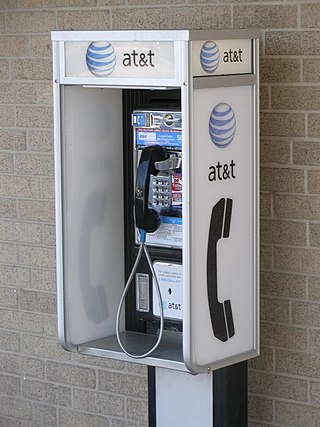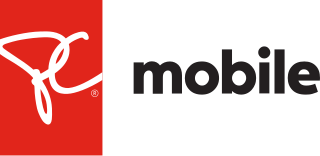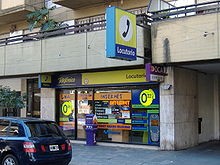
A telephone switchboard was a device used to connect circuits of telephones to establish telephone calls between users or other switchboards, throughout the 20th century. The switchboard was an essential component of a manual telephone exchange, and was operated by switchboard operators who used electrical cords or switches to establish the connections.

A payphone is typically a coin-operated public telephone, often located in a telephone booth or in high-traffic public areas. Prepayment is required by inserting coins or telephone tokens, swiping a credit or debit card, or using a telephone card.

A blue box is an electronic device that produces tones used to generate the in-band signaling tones formerly used within the North American long-distance telephone network to send line status and called number information over voice circuits. This allowed an illicit user, referred to as a "phreaker", to place long-distance calls, without using the network's user facilities, that would be billed to another number or dismissed entirely as an incomplete call. A number of similar "color boxes" were also created to control other aspects of the phone network.
Phone fraud, or more generally communications fraud, is the use of telecommunications products or services with the intention of illegally acquiring money from, or failing to pay, a telecommunication company or its customers.
Rogers Wireless Inc. is a Canadian wireless telephone company headquartered in Toronto, providing service nationally throughout Canada. It is a wholly owned subsidiary of Rogers Communications. The company had revenues of just under $15.1 billion in 2018. Rogers Wireless is the largest wireless carrier in Canada, with 11.3 million subscribers as of Q2 2023.

Fido Solutions Inc. is a Canadian mobile network operator owned by Rogers Communications. Since its acquisition by Rogers in 2004, it has operated as a Mobile virtual network operator (MVNO) using the Rogers Wireless network.
GSM services are a standard collection of applications and features available over the Global System for Mobile Communications (GSM) to mobile phone subscribers all over the world. The GSM standards are defined by the 3GPP collaboration and implemented in hardware and software by equipment manufacturers and mobile phone operators. The common standard makes it possible to use the same phones with different companies' services, or even roam into different countries. GSM is the world's most dominant mobile phone standard.

A prepaid mobile device, also known as a pay-as-you-go (PAYG), pay-as-you-talk, pay and go, go-phone, prepay or burner phone, is a mobile device such as a phone for which credit is purchased in advance of service use. The purchased credit is used to pay for telecommunications services at the point the service is accessed or consumed. If there is no credit, then access is denied by the cellular network or Intelligent Network. Users can top up their credit at any time using a variety of payment mechanisms.
In telecommunications, a long-distance call (U.S.) or trunk call is a telephone call made to a location outside a defined local calling area. Long-distance calls are typically charged a higher billing rate than local calls. The term is not necessarily synonymous with placing calls to another telephone area code.
Telus Mobility is a Canadian wireless network operator and a division of Telus Communications which sells wireless services in Canada on its numerous networks. It operates 5G, LTE and HSPA+ on its mainstream networks. Telus Mobility is the second-largest wireless carrier in Canada, with 10.6 million subscribers as of Q3 2020.
The Mobile Telephone Service (MTS) was a pre-cellular VHF radio system that linked to the Public Switched Telephone Network (PSTN). MTS was the radiotelephone equivalent of land dial phone service.

Q-Telecom was the fourth mobile telephony provider in Greece. It began operation in June 2002. As of 2008, it called itself "Q" and called its services "MyQ." The company provided GSM phone service, supported by LMDS and backbone networks, and called itself the only complete and integrated telecom provider in Greece. In May 2007, it merged with WIND Hellas, which was known at the time as TIM Hellas.

Virgin Plus is a Canadian provider of postpaid and prepaid wireless voice, text and data communications services throughout Canada. They also offer home Internet and TV services in select areas of Ontario and Quebec. Launched as Virgin Mobile Canada on March 1, 2005, as a joint venture between Virgin Group and BCE Inc., BCE took sole ownership on July 1, 2009, when it closed a deal to purchase the stake it did not already own. Virgin Plus calls its customers 'Members' and offers a Member Benefits program, which provides its customers with special offers, discounts, and VIP experiences.

Solo Mobile is a discontinued mobile virtual network operator in Canada started by Bell Mobility in 2000. Historically, Solo was considered a discount wireless brand, offering low price monthly plans with some unlimited options in certain cities. Its products and services were only sold in British Columbia, Alberta, Ontario and Quebec. The brand ceased advertising towards new customers since November 2011, and new activations were officially discontinued on May 17, 2012.

Phone sex is a conversation between two or more people by means of the telephone which is sexually explicit and is intended to provoke sexual arousal in one or more participants. As a practice between individuals temporarily separated, it is as old as dial telephones, on which no operator could eavesdrop. In the later 20th century businesses emerged offering, for a fee, sexual conversations with a phone sex worker.
The postpaid mobile phone is a mobile phone for which service is provided by a prior arrangement with a mobile network operator. The user in this situation is billed after the fact according to their use of mobile services at the end of each month. Typically, the customer's contract specifies a limit or "allowance" of minutes, text messages etc., and the customer will be billed at a flat rate for any usage equal to or less than that allowance. Any usage above that limit incurs extra charges. Theoretically, a user in this situation has no limit on use of mobile services and, as a consequence, unlimited credit. This service is better for people with a secured income.

Koodo Mobile is a Canadian mobile flanker brand started by Telus in 2008 and mostly oriented toward younger customers. Koodo differs from its parent Telus by not requiring a fixed term contract. Koodo currently provides postpaid, prepaid, and wireless home phone services. Being a subsidiary of Telus, Koodo has been able to offer extensive coverage and a strong presence in mobile retailers. This allowed Koodo to gain a presence nationwide.
Zong was a mobile payment company that allowed users to make micropayments on the Internet if they have a postpaid mobile phone. The payments were charged to their mobile phone bills by the mobile operator. The company was acquired by eBay in 2011 and disappeared in 2015.
The history of the prepaid mobile phones began in the 1990s when mobile phone operators sought to expand their market reach. Up until this point, mobile phone services were exclusively offered on a postpaid basis (contract-based), which excluded individuals with poor credit ratings and minors under the age of 18 In early 1991, Kenneth Johnson of Queens, New York along with Mark Feldman, Pedro Diaz and Kevin Lambright of Alicomm Mobile, was the first to successfully create a prepaid cellular phone and Network. His company expanded to a Sales force from Maine to Florida. Two years later others would come out with similar systems.

PC Mobile is a licensed white label prepaid wireless service operated in Canada. Its mobile telephone products and services operate on the network infrastructure operated by Bell Mobility and formerly Telus Mobility, but licensed the proprietary branding and payment media with the President's Choice supermarket store brand owned by Loblaws Inc. It also operates mobile phone kiosks in Loblaws banner stores under the name The Mobile Shop.











